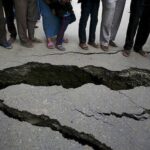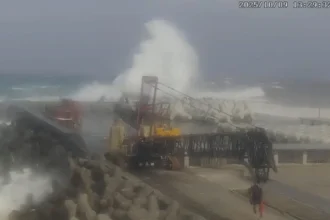The collapse of a key network of ocean currents in the Atlantic could plunge parts of the world into an icy deep freeze sending temperatures in some European cities down to nearly -55°F and triggering profound climate and societal upheaval, according to a new study.
Scientists are increasingly alarmed about the future of the Atlantic Meridional Overturning Circulation (AMOC) a powerful “conveyor belt” of ocean water. It pulls warm water from the tropics up toward the North, where it cools, drops, and flows back south.
Studies suggest the AMOC is weakening and may collapse sometime this century due to climate change. If it were to break down, it would bring dramatic climate impacts from freezing European winters to more violent storms transforming the climate we know today.
Researchers from Utrecht University in the Netherlands wanted to find out how an AMOC collapse would affect a warming world. “What if the AMOC collapses and we have climate change? Does the cooling win or does the warming win?” asked René van Westen, lead author of the study.
Using models projecting an 80% weakening of the AMOC under 2°C of warming, the team found substantial drops in European temperatures with freezing conditions extending much farther south even while much of the USA remained warm.
London, for example, could see freezing conditions plunge to -2°F, while Oslo could experience temperatures falling to -55°F and stay below freezing nearly half the year. Furthermore, sea ice would advance toward Scandinavia and the UK, reflecting solar radiation back into space and adding to the freezing effects.
The collapse would also affect global climate patterns, strengthening the jet stream and fueling more powerful storms in northwest Europe.
“It completely transforms the narrative. Policy makers are preparing for a warming future, but we may need to be ready for freezing conditions in some regions instead,” Van Westen explained.
Such dramatic drops in temperature could undermine food production, damage infrastructure, and harm societies unprepared for freezing conditions in a warming world.
Meanwhile, the Southern Hemisphere is projected to warm further in this scenario adding to growing climate impacts there.
Scientists also investigated a future with 4°C warming and found the warming dominates in that scenario although the AMOC collapse still brings dramatic effects, including higher sea levels and greater coastal flooding.
“It’s hard to overstate how much an AMOC collapse would affect human life. We want to avoid it at all costs,” Van Westen said.
Oceanographer Stefan Rahmstorf and climate scientist Richard Allen stressed the importance of keeping a close watch on these signals, noting the future trajectory of the AMOC hangs on a delicate balance between opposing climate trends warming from greenhouse emissions and freezing from a weakening ocean circulation.
The study underscores the urgency to cut emissions and avoid a collapse while also strengthening climate monitoring and preparedness strategies in a world increasingly influenced by climate change














